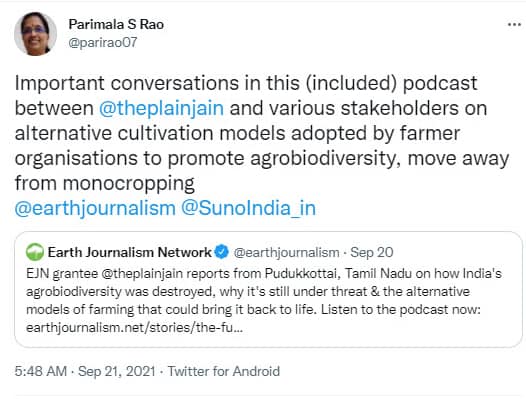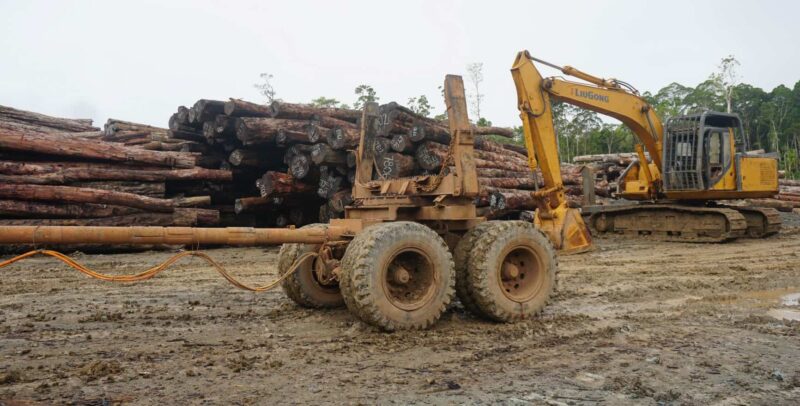Updates from Internews’ Earth Journalism Network
“There’s no such thing as clean coal. There are many other alternative sources of energy that we should instead pay attention to.”
Renz Tenorio, a convenor of the No To Coal Movement (From: Coal Plants Stoke Community Fears in the Philippines, published by the Philippine Daily Inquirer as part of EJN’s Special Reporting Project, “Available But Not Needed.”)
A pivotal moment in the fight to combat climate change is fast approaching. At the 26th UN Climate Change Conference of the Parties (COP26) in November, countries will review commitments to keep warming below 1.5C. We’re pleased to announce that 20 journalists from developing countries have been awarded a CCMP fellowship to cover the proceedings live from Glasgow.
Meanwhile, the COVID-19 pandemic serves as an ever-present reminder of the grave impacts of zoonotic outbreaks. Sixteen new EJN grantees from across Asia have just set out to report on diseases that jump from animals to humans, and this month we’re hosting a webinar for journalists to better understand the science of spillover, and solutions to prevent the next outbreak.
We’re equally excited to announce the launch of a new project to support reporting on the green (or not-so-green) recovery plans put forward by governments to reinvigorate economies impacted by COVID-19. This project will also deepen our support to Indigenous reporters, and we’ll be releasing a call for journalists to submit ideas for story grants on both topics soon.
Ocean journalists in our network should also check out two new webinars on IUU fishing, and media organizations looking to fund projects related to biodiversity and conservation are invited to apply for our newest grant opportunity.
Last but not least, we share an update from the Solomon Islands, where an EJN grantee’s investigation exposed the illegal logging activities of two timber companies — and led to their suspension.
If you received this newsletter from a friend, subscribe here:
Twenty Journalists Awarded Fellowships to Attend and Report on COP26 in Glasgow, Scotland
EJN and the Stanley Center for Peace and Security are pleased to announce that 20 journalists from developing countries have been awarded fellowships to cover the COP26 as part of the Climate Change Media Partnership (CCMP) program. Read more
Logging Exposé in the Solomon Islands Leads to Companies’ Suspension
The Solomon Islands already bears the brunt of climate change impacts such as rising sea levels and frequent typhoons of escalating intensity. But perhaps what concerns its remote, Indigenous communities most is the extent of unsustainable and allegedly illegal logging that has begun to decimate their natural forests.

To uncover the rampant unsustainable logging in Solomon Islands, investigative journalist Ofani Eremae journeyed to Korona on San Jorge Island in Isabel Province — a region that is heavily threatened by logging activities. After his story was published, the Solomon Forest Association suspended two of its members over their illegal harvesting of the protected tubi trees. Read more
EJN-Supported Course Encourages Data-Driven Investigations About the Amazon
Between August 2020 and July 2021, the Amazon lost 10,476 square kilometers of rainforest, according to Imazon, the Institute of Man and Environment of the Amazon, a Brazilian research institute. It’s a climate, environment and socio-political crisis that reporters are striving to report on more deeply. Earlier this year, EJN supported the School of Data Brazil to develop an online course that would enable journalists to do exactly this. Read more
EJN Awards 16 Journalists Grants to Report on Zoonotic Diseases and One Health in Asia
To raise awareness of the root causes of zoonotic diseases and ways to prevent the next zoonotic disease outbreak, EJN has selected 16 journalists across Asia to report on zoonoses and highlight efforts by scientists, public health professionals and others in their region to prevent zoonotic disease. Read more
EJN Launches New Project to Report on Green Recovery and Indigenous Rights
We’re excited to announce the launch of a new two-year project to improve media coverage of two highly topical environmental issues. With support from Svenska Postkodstiftelsen (the Swedish Postcode Foundation), this work will shine a spotlight on the so-called “green recovery” emerging from the outbreak of the Covid-19 pandemic, as well as the role of Indigenous peoples as defenders of most of the world’s remaining biodiversity. Learn more
EJN Announces a Special Project on Fossil Fuel Investment in Asia
“Available But Not Needed” is EJN’s newest special collaborative journalism project exploring how public and private investment continues to fund fossil fuel economies in Asia, even as many worry about an economic recovery dependent on coal and natural gas at its core.Bringing together 6 media outlets and more than a dozen reporters across 7 countries, this months-long project investigates why this investment continues and what the consequences are for local communities and the global climate. Read the first few stories and stay tuned for more in the coming weeks.

Webinars
How Do Diseases Jump from Animals to Humans? Reporting on Zoonotic Spillover Ecosystems
The spillover of viral pathogens from animals to humans became a hot topic as soon as the Covid-19 pandemic began. Understanding the context and factors that could increase risks of spillover is key to covering the topic well. Journalists looking to learn more and find innovative story ideas in their local communities: don’t miss this webinar!
Date: September 29 | 9am DC / 2pm London / 6:30pm New Delhi / 8pm Bangkok
IUU fishing on the Pacific coasts of the Andean countries, with an emphasis on the Galapagos Islands
Illegal fishing is the world’s sixth most lucrative criminal economy with estimated revenues of $15 to $36 billion. In recent years, Ecuador, and in particular the Galapagos, is a key stop on a larger transnational illegal fishing route that includes Argentina, Chile and Peru. Latin American journalists reporting on IUU fishing should tune in to hear from regional experts in marine biology, marine ecology and international trade law. This webinar will be conducted in Spanish.
Date: October 13 | 5pm Lima/Quito / 7pm Buenos Aires/Santiago
Ending IUU Fishing and Harmful Fisheries Subsidies in Japan
In case you missed it, in July, the Environmental Partnership Council, an EJN partner, hosted a webinar on ending Illegal, Unreported and Unregulated (IUU) fishing in Japan. Speakers discussed ongoing efforts to prevent IUU-caught seafood from entering the market, and explained how harmful fisheries subsidies exacerbate this crisis, within Japan and internationally.
Opportunities & Resources
- As part of EJN’s Biodiversity Media Initiative, we are pleased to announce a grant call for journalist networks, media organizations, civil society organizations or academic institutions working to improve media coverage of biodiversity and conservation issues. We are especially interested in projects that focus on conservation in biodiversity-rich regions of the world, such as the Amazon, Central Africa and Southeast Asia. Apply by October 15.
- Looking ahead to the COP26 Climate Summit in Glasgow this November and beyond, journalists will need a solid understanding of the recently released IPCC Working Group I report in order to ground their reporting in the latest science on climate change. Our latest tipsheet highlights the report’s key findings and includes guidance straight from the IPCC experts themselves.
What we’re reading, watching, listening to
- Reading: Oceans Inc, a cross-border investigative reporting project on IUU fishing. Journalists from over a dozen newsrooms spent nearly a year working together as part of the Environmental Reporting Collective to expose crimes in the global fishing industry, from the South China Sea to the Antarctic.
- Watching: On September 29, we’ll be tuning in to VideoRev’s online training on how to use video to help the climate movement at COP26. Whether you’re attending the conference in Glasgow or not, there’ll be practical advice aplenty for journalists, campaigners and filmmakers looking to create rapid response videos that make an impact and maybe even go viral.
- Listening to: “There is really no dividing line between the health of people, animals, and the environment.” In this episode of Trend Lines, a podcast from World Politics Review, STOP Spillover Project Director Deborah Kochevar discusses what we can do to stop future zoonotic spillovers from animals to humans.
